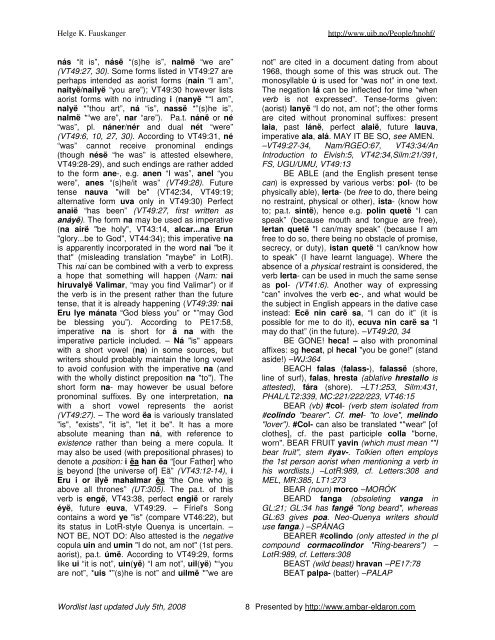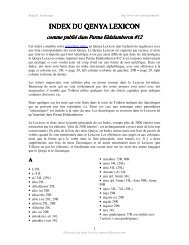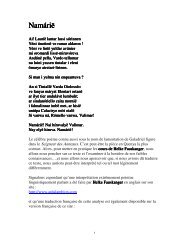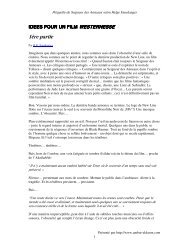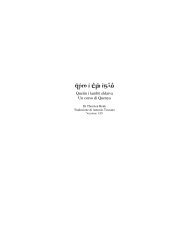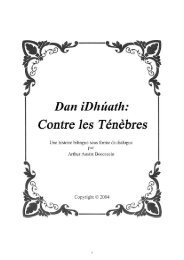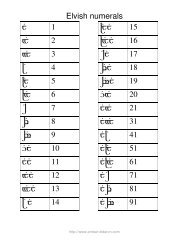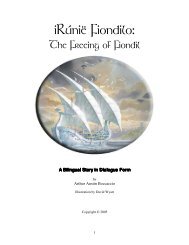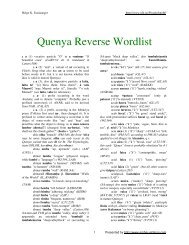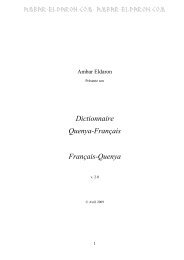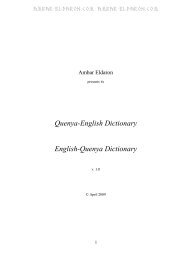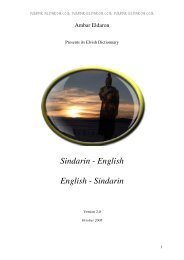English – Quenya - Ambar Eldaron
English – Quenya - Ambar Eldaron
English – Quenya - Ambar Eldaron
You also want an ePaper? Increase the reach of your titles
YUMPU automatically turns print PDFs into web optimized ePapers that Google loves.
Helge K. Fauskanger http://www.uib.no/People/hnohf/<br />
nás “it is”, násë “(s)he is”, nalmë “we are”<br />
(VT49:27, 30). Some forms listed in VT49:27 are<br />
perhaps intended as aorist forms (nain “I am”,<br />
naityë/nailyë “you are”); VT49:30 however lists<br />
aorist forms with no intruding i (nanyë *“I am”,<br />
nalyë *”thou art”, ná “is”, nassë *”(s)he is”,<br />
nalmë *“we are”, nar “are”). Pa.t. nánë or né<br />
“was”, pl. náner/nér and dual nét “were”<br />
(VT49:6, 10, 27, 30). According to VT49:31, né<br />
“was” cannot receive pronominal endings<br />
(though nésë “he was” is attested elsewhere,<br />
VT49:28-29), and such endings are rather added<br />
to the form ane-, e.g. anen “I was”, anel “you<br />
were”, anes “(s)he/it was” (VT49:28). Future<br />
tense nauva "will be" (VT42:34, VT49:19;<br />
alternative form uva only in VT49:30) Perfect<br />
anaië “has been” (VT49:27, first written as<br />
anáyë). The form na may be used as imperative<br />
(na airë "be holy", VT43:14, alcar...na Erun<br />
"glory...be to God", VT44:34); this imperative na<br />
is apparently incorporated in the word nai "be it<br />
that" (misleading translation "maybe" in LotR).<br />
This nai can be combined with a verb to express<br />
a hope that something will happen (Nam: nai<br />
hiruvalyë Valimar, “may you find Valimar”) or if<br />
the verb is in the present rather than the future<br />
tense, that it is already happening (VT49:39: nai<br />
Eru lye mánata “God bless you” or *”may God<br />
be blessing you”). According to PE17:58,<br />
imperative na is short for á na with the<br />
imperative particle included. <strong>–</strong> Ná "is" appears<br />
with a short vowel (na) in some sources, but<br />
writers should probably maintain the long vowel<br />
to avoid confusion with the imperative na (and<br />
with the wholly distinct preposition na "to"). The<br />
short form na- may however be usual before<br />
pronominal suffixes. By one interpretation, na<br />
with a short vowel represents the aorist<br />
(VT49:27). <strong>–</strong> The word ëa is variously translated<br />
"is", "exists", "it is", "let it be". It has a more<br />
absolute meaning than ná, with reference to<br />
existence rather than being a mere copula. It<br />
may also be used (with prepositional phrases) to<br />
denote a position: i ëa han ëa “[our Father] who<br />
is beyond [the universe of] Eä” (VT43:12-14), i<br />
Eru i or ilyë mahalmar ëa “the One who is<br />
above all thrones” (UT:305). The pa.t. of this<br />
verb is engë, VT43:38, perfect engië or rarely<br />
éyë, future euva, VT49:29. <strong>–</strong> Fíriel's Song<br />
contains a word ye "is" (compare VT46:22), but<br />
its status in LotR-style <strong>Quenya</strong> is uncertain. <strong>–</strong><br />
NOT BE, NOT DO: Also attested is the negative<br />
copula uin and umin "I do not, am not" (1st pers.<br />
aorist), pa.t. úmë. According to VT49:29, forms<br />
like ui “it is not”, uin(yë) “I am not”, uil(yë) *“you<br />
are not”, *uis *”(s)he is not” and uilmë *”we are<br />
not” are cited in a document dating from about<br />
1968, though some of this was struck out. The<br />
monosyllable ú is used for “was not” in one text.<br />
The negation lá can be inflected for time “when<br />
verb is not expressed”. Tense-forms given:<br />
(aorist) lanyë “I do not, am not”; the other forms<br />
are cited without pronominal suffixes: present<br />
laia, past lánë, perfect alaië, future lauva,<br />
imperative ala, alá. MAY IT BE SO, see AMEN. %<br />
<strong>–</strong>VT49:27-34, Nam/RGEO:67, VT43:34/An<br />
Introduction to Elvish:5, VT42:34,Silm:21/391,<br />
FS, UGU/UMU, VT49:13<br />
BE ABLE (and the <strong>English</strong> present tense<br />
can) is expressed by various verbs: pol- (to be<br />
physically able), lerta- (be free to do, there being<br />
no restraint, physical or other), ista- (know how<br />
to; pa.t. sintë), hence e.g. polin quetë “I can<br />
speak” (because mouth and tongue are free),<br />
lertan quetë "I can/may speak” (because I am<br />
free to do so, there being no obstacle of promise,<br />
secrecy, or duty), istan quetë “I can/know how<br />
to speak” (I have learnt language). Where the<br />
absence of a physical restraint is considered, the<br />
verb lerta- can be used in much the same sense<br />
as pol- (VT41:6). Another way of expressing<br />
“can” involves the verb ec-, and what would be<br />
the subject in <strong>English</strong> appears in the dative case<br />
instead: Ecë nin carë sa, “I can do it” (it is<br />
possible for me to do it), ecuva nin carë sa “I<br />
may do that” (in the future). <strong>–</strong>VT49:20, 34<br />
BE GONE! heca! <strong>–</strong> also with pronominal<br />
affixes: sg hecat, pl hecal "you be gone!" (stand<br />
aside!) <strong>–</strong>WJ:364<br />
BEACH falas (falass-), falassë (shore,<br />
line of surf), falas, hresta (ablative hrestallo is<br />
attested), fára (shore). <strong>–</strong>LT1:253, Silm:431,<br />
PHAL/LT2:339, MC:221/222/223, VT46:15<br />
BEAR (vb) #col- (verb stem isolated from<br />
#colindo "bearer". Cf. mel- "to love", melindo<br />
"lover"). #Col- can also be translated *"wear" [of<br />
clothes], cf. the past participle colla "borne,<br />
worn". BEAR FRUIT yavin (which must mean *"I<br />
bear fruit", stem #yav-. Tolkien often employs<br />
the 1st person aorist when mentioning a verb in<br />
his wordlists.) <strong>–</strong>LotR:989, cf. Letters:308 and<br />
MEL, MR:385, LT1:273<br />
BEAR (noun) morco <strong>–</strong>MORÓK<br />
BEARD fanga (obsoleting vanga in<br />
GL:21; GL:34 has fangë "long beard", whereas<br />
GL:63 gives poa. Neo-<strong>Quenya</strong> writers should<br />
use fanga.) <strong>–</strong>SPÁNAG<br />
BEARER #colindo (only attested in the pl<br />
compound cormacolindor "Ring-bearers") <strong>–</strong><br />
LotR:989, cf. Letters:308<br />
BEAST (wild beast) hravan <strong>–</strong>PE17:78<br />
BEAT palpa- (batter) <strong>–</strong>PALAP<br />
Wordlist last updated July 5th, 2008 8 Presented by http://www.ambar-eldaron.com


